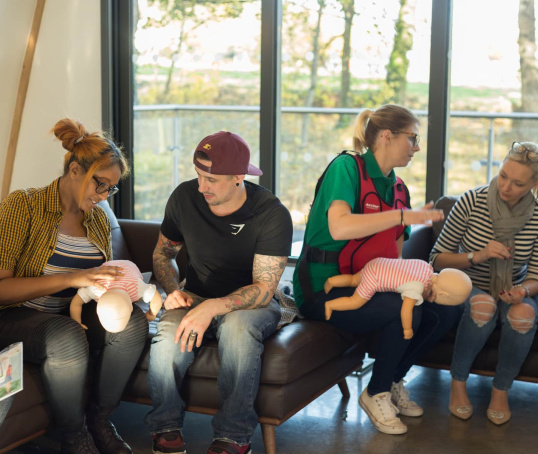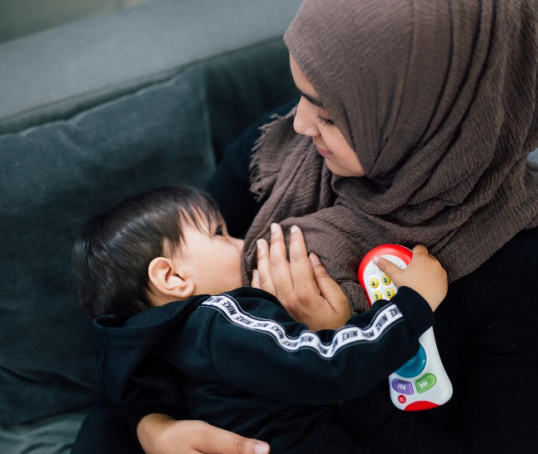Without doubt, the weeks after you have a baby can feel surreal and overwhelming. Here are some way to make coping with a newborn a lot easier.
1. Consider your priorities
Write them down and keep the list where you can see it. In the first few weeks, try to cut down everything to the minimum – usually just looking after your tiny baby. Let someone else deal with the rest.
2. Batch cook when pregnant
Stock the freezer up. As a new mum, you will love how efficient you were when pregnant and making huge batches of food for your exhausted post-birth self.
3. Make lists
You might be feeling overwhelmed by all the ‘normal’ things that you’re not getting through. While you’re in a fog of feeding, burping and changing, write a list of things to tackle when life settles down again. It might make you feel better about shelving them.
4. Don’t lose perspective
You might feel like this strange hibernation phase will go on forever but it won’t, we promise. In fact, it actually lasts for a very short period and you’ll soon be back in the real world and kind of missing it (NCT, 2012).
5. Keep nappies and changes of clothes close by
We’re talking about leaving nappies and clothing changes in every room where your baby is likely to be. Dashing upstairs to grab something might not have seemed difficult before but it will now, with a crying baby and someone ringing the doorbell.
6. Accept offers of help from visitors
Absolutely yes, let your visitor wash up or do the ironing. You don’t have to let them cuddle your baby and make them tea when you still feel exhausted after the birth.
7. Try a baby sling
Slip your newborn into a baby sling tied onto your front. You’ll be amazed how much you can get done around the house while your baby is content being close to you.
8. Relax
Don’t ever feel like you’re ‘sitting around and doing nothing’ when you have a newborn. It might be an instinct in people who are used to multitasking to feel guilty when relaxing.
Now is a crucial and irreplaceable time to bond with your baby. So enjoy gazing at them, feeling them grab your finger and lay there stroking their face. Don’t feel guilty.
9. Surround yourself with supporters
Talk to your partner, relatives or friends about how you’re feeling. If you’re worried about anything, pick up the phone to your midwife, health visitor or GP.
Remember the old saying about how it takes a village to raise a child. You can’t do this alone, no matter what your situation, so learn to ask for help.
10. Rest
The old clichéd suggestion of ‘sleeping while the baby sleeps’ might sound unrealistic to mums getting frustrated they can’t sleep despite exhaustion. If this is you, at least rest and relax when your baby sleeps.
Put your favourite TV show on, soak in a bath or curl up in bed with a book. That way you’ll feel a lot more ready to tackle the next part when the baby wakes. Talk to your health visitor or GP if you think you might be getting depressed (NCT, 2012; MIND, 2016).
11. Look after yourself
Take extra care of yourself in the daytime with nourishing, healthy food and gentle exercise like walking or yoga. Try to rest as much as possible.
Taking extra care of yourself isn’t an indulgence. In fact, it will benefit your mental health at a time when it can be easy to not think about yourself at all (WHO, 2008). That’s also hugely important for your baby.
12. Meet other parents
While it can be tempting not to get dressed or leave the house with a newborn, it will make you feel about a lot better if you get out there. This’ll give you the chance to see other adults who have young babies.
You might join a baby group, find out what's happening at your local NCT branch, catch up with NCT friends or go on an app like Mush that matches you up with mum friends near you. Whichever way you choose to meet others, you’ll feel more confident, supported and human. We can’t recommend it enough.
13. Do what you used to love doing
You might not be up for doing anything too demanding right now. Yet doing the things that you loved doing alone before you had a baby can improve your wellbeing hugely. Book a hair appointment, go for a swim, or grab some baby-free lunch catching up with a friend.
14. Stockpile some sleep
Without a doubt, the number one new baby difficulty is sleep deprivation. Broken sleep with night feeds in the early weeks can be challenging. We've got lots of tips to help you cope with night feeds here.
You could also try co-sleeping with your baby in bed for part of the night or during the day. Some parents find this helps them get a bit more sleep.
15. Do it as a team
Nothing makes the early weeks and months harder than feeling like you are alone. So if you have a partner, always lean on them for help and support. Keep talking to each other about how you’re feeling. That communication will help you better understand each other and what you need in those early days (NCT, 2012).
If you are a single parent, lean on good friends and family for support and help. Find friends who are also parents, and who you can share all the highs and lows of parenthood with.
This page was last reviewed in June 2018
Further information
Our support line offers practical and emotional support with feeding your baby and general enquiries for parents, members and volunteers: 0300 330 0700.
You might find attending one of NCT's Early Days groups helpful as they give you the opportunity to explore different approaches to important parenting issues with a qualified group leader and other new parents in your area.
Make friends with other parents-to-be and new parents in your local area for support and friendship by seeing what NCT activities are happening nearby.
Home-Start has a parent-helper visiting scheme along with a helpline: 08000 68 63 68, 8am-8pm, Mon-Fri and 9am-12pm Sat.
healthtalk.org has a comprehensive library of face-to-face interviews where parents share their experiences about breastfeeding, birth, parenting and many other issues.





